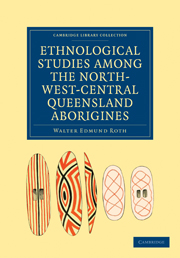Book contents
- Frontmatter
- PREFACE
- BIBLIOGRAPHY
- Contents
- ILLUSTRATIONS
- CHAPTER I THE SPOKEN LANGUAGE OF THE PITTA-PITTA ABORIGINALS: AN ELEMENTARY GRAMMAR
- CHAPTER II TABULAR COMPARISON BETWEEN VARIOUS SELECTED WORDS USED IN THE DIFFERENT ETHNOGRAPHICAL DISTRICTS OF NORTH-WEST-CENTRAL QUEENSLAND
- CHAPTER III SOCIAL AND INDIVIDUAL NOMENCLATURE: CLASS SYSTEMS, &c
- CHAPTER IV THE EXPRESSION OF IDEAS BY MANUAL SIGNS: A SIGN LANGUAGE
- CHAPTER V THE SEARCH FOR FOOD. PITURI
- CHAPTER VI DOMESTIC IMPLEMENTS AND UTENSILS. FIRE-STICKS AND YAM-STICKS. HUTS AND SHELTERS
- CHAPTER VII PERSONAL ORNAMENTATION AND DECORATION. MURAL PAINTING, &C.
- CHAPTER VIII RECREATION: CORROBBOREES, SPORTS, AND GAMES
- CHAPTER IX TRAVEL, TRADE, AND BARTER. THE SO-CALLED LETTER OR MESSAGE-STICK
- CHAPTER X THE MAINTENANCE OF LAW AND ORDER: FIGHTING, FIGHTING WEAPONS
- CHAPTER XI DISEASE, ACCIDENT, DEATH. CANNIBALISM
- CHAPTER XII RAIN-MAKING, THUNDER AND LIGHTNING-MAKING
- CHAPTER XIII ETHNO-PORNOGRAPHY
- INDEX AND GLOSSARY
- Plate section
CHAPTER IX - TRAVEL, TRADE, AND BARTER. THE SO-CALLED LETTER OR MESSAGE-STICK
Published online by Cambridge University Press: 29 August 2010
- Frontmatter
- PREFACE
- BIBLIOGRAPHY
- Contents
- ILLUSTRATIONS
- CHAPTER I THE SPOKEN LANGUAGE OF THE PITTA-PITTA ABORIGINALS: AN ELEMENTARY GRAMMAR
- CHAPTER II TABULAR COMPARISON BETWEEN VARIOUS SELECTED WORDS USED IN THE DIFFERENT ETHNOGRAPHICAL DISTRICTS OF NORTH-WEST-CENTRAL QUEENSLAND
- CHAPTER III SOCIAL AND INDIVIDUAL NOMENCLATURE: CLASS SYSTEMS, &c
- CHAPTER IV THE EXPRESSION OF IDEAS BY MANUAL SIGNS: A SIGN LANGUAGE
- CHAPTER V THE SEARCH FOR FOOD. PITURI
- CHAPTER VI DOMESTIC IMPLEMENTS AND UTENSILS. FIRE-STICKS AND YAM-STICKS. HUTS AND SHELTERS
- CHAPTER VII PERSONAL ORNAMENTATION AND DECORATION. MURAL PAINTING, &C.
- CHAPTER VIII RECREATION: CORROBBOREES, SPORTS, AND GAMES
- CHAPTER IX TRAVEL, TRADE, AND BARTER. THE SO-CALLED LETTER OR MESSAGE-STICK
- CHAPTER X THE MAINTENANCE OF LAW AND ORDER: FIGHTING, FIGHTING WEAPONS
- CHAPTER XI DISEASE, ACCIDENT, DEATH. CANNIBALISM
- CHAPTER XII RAIN-MAKING, THUNDER AND LIGHTNING-MAKING
- CHAPTER XIII ETHNO-PORNOGRAPHY
- INDEX AND GLOSSARY
- Plate section
Summary
224. The “Walk-about” is perhaps, in its ultimate results, one of the most important institutions in vogue among the aboriginals, and yet one on account of which their white brethren will, as often as not. hold them up to ridicule and contempt. To the settlers it is considered in the light of an excuse for a holiday or for shirking the work upon which the blacks would otherwise be employed: surmises that in some cases may be perfectly correct. In the majority of instances, however, this walk-about is but part and parcel of the great trading or bartering system which is more or less continually going on throughout the various districts. Certain trade-routes laid down from time immemorial along their own or messmates' country are followed by the members of a tribe or tribes, along which each knows that he is free to travel unmolested: these routes, of greater or less extent, are rigidly adhered to. The opening of the local market, so to speak, may take place at the instance of one of the elders or “bosses” at one of the larger camps, e.g., Marion Downs, Fort Constantine, &c., where instructions are issued as to when to leave, whom to go, what to take, and what to return with. In smaller and less frequented encampments, e.g., Boulia, the peregrination may commence when any fresh pituri is seen knocking about for sale, this being a pretty certain indication that their neighbours elsewhere must all be on the walk-about themselves.
- Type
- Chapter
- Information
- Publisher: Cambridge University PressPrint publication year: 2010First published in: 1897



